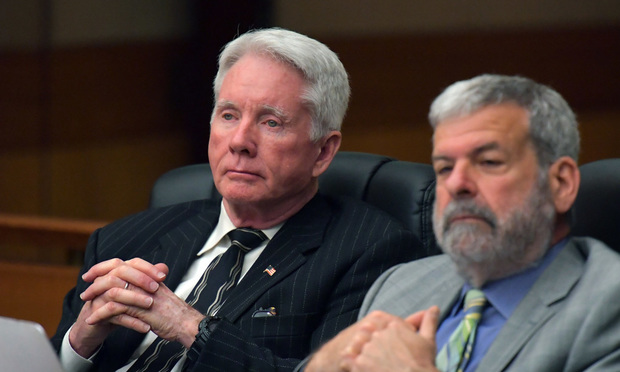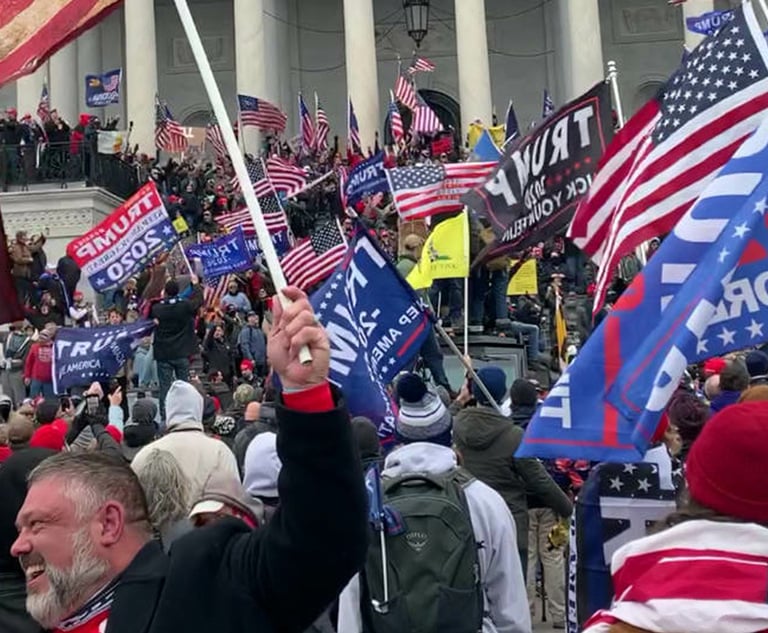Jury Hears Tex McIver in Recording Tell Police How He Shot His Wife
Jurors on Thursday listened to an audio recording of Tex McIver's first interview with detectives after he shot and killed his wife.
March 22, 2018 at 08:23 PM
6 minute read

Atlanta attorney Claud “Tex” McIver waited more than two days after he shot and killed his wife before he agreed to meet with Atlanta police to tell them what happened.
When he did, McIver brought two attorneys with him, one of whom prefaced his interview with an explanation of the circumstances surrounding Diane McIver's shooting.
On Thursday, during McIver's ongoing murder trial, Fulton County prosecutors played a redacted version of that first interview with homicide detectives on Sept. 28, 2016.
But before McIver told police his version of the minutes leading up to the moment his gun fired, Decatur criminal defense lawyer Stephen Maples gave an overview of what McIver would say. As emergency personnel at Emory University Hospital tried unsuccessfully to save Diane McIver's life, McIver summoned Maples to the hospital, even as he acknowledged to family friend Dani Jo Carter, “I know this doesn't look good.”
McIver, who has never denied firing the shot that killed his wife, is on trial on charges of malice murder, felony murder and three counts of influencing witnesses. McIver and his lawyers have always insisted the gun fired accidentally. Prosecutors claim McIver had a financial motivation after he lost his equity partnership at Atlanta's Fisher & Phillips in 2014.
An ER nurse and an Emory police officer have testified that they overheard Maples and McIver talking about “a plan” for what McIver should say.
Carter, the sole witness to the shooting, was driving the McIvers home from a weekend at the couple's ranch near Lake Oconee when McIver fired a shot through the back of the front passenger seat where his wife was sitting.
Maples told homicide detectives that McIver's “only recollection” was that the gun was in a plastic bag, and he was ”holding it down” between his legs when it discharged. But Maples insisted McIver “didn't play with the hammer” of the Smith & Wesson .38-caliber revolver, and, “He didn't pull back full cock” so that it would have been easier to fire.
In his interview with homicide detectives, McIver echoed his attorney's account of the shooting. He said he was asleep in the SUV after a long day playing golf that left him “real tired.”
McIver said he awoke when the SUV left the interstate coming into downtown Atlanta. He recalled asking Carter and his wife: “Girls, where are we and what's happening here?”
At the time, McIver told police, the trio was passing through “an area I thought was particularly dangerous at night. I had seen police vehicles there with blue lights on. They were doing things with people.”
It was also “very dark” and had “a particular high population of homeless,” he added. “There were a lot of people. I quickly said, 'This is a big mistake. We are in a place we don't belong.'”
McIver said he felt vulnerable because he was “in a big SUV with two women in the front seat” and that it seemed like “every turn we made, the street was darker and more people were milling about. It kind of makes the hair rise on the back of your neck.”
So, McIver said, he asked his wife, “I'd like to, if you don't mind, please hand me my gun.”
But McIver said his alarm subsided as the SUV reached Piedmont Road and began traveling north through an increasingly upscale area.
“I guess I laid back again and went to sleep,” he said. Then Carter came to a stop. “I just started to wake up … and I was handling the gun,” he told the detectives. “I didn't realize it was in my lap. And it went off.”
McIver said he “immediately called out, 'Is everybody all right?'” Carter said yes. But his wife said, “I've been shot,” McIver recalled. “So I put my arms around her to try to determine how bad it was.”
McIver said he then made an “immediate judgment” that Emory University Hospital was closest, although four other hospitals, including the city's two Trauma I facilities, were closer.
“I will never forget it as long as I live,” McIver said of their arrival at the ER. “As we pulled up to the door, I got up and yelled, 'Gunshot wound!' People were scurrying around. They come out with a gurney. They rolled her in. I'm holding her hand.”
But a videotape of the SUV's arrival doesn't show McIver racing for help but rather walking alongside the SUV as he signals Carter where to stop. He then opens the SUV's passenger door as a valet brings a wheelchair. Seconds tick by until a parking supervisor notifies nurses who then come racing to the SUV. As they struggle to wheel an unconscious Diane McIver into the emergency room, Tex McIver is not holding his wife's hand.
McIver insisted he remained with his wife, still holding her hand, until an ER physician asked him to leave and he “just watched through the glass.” McIver also told detectives that the physician treating his wife informed him that his wife had said the shooting was “just an accident.”
McIver said after his wife died, “I went in to see her, to tell her goodbye.” He said he remained at the hospital because “I just didn't want to leave. She was there.” By then, police had impounded the SUV.
McIver's story to police diverged from Carter's own account. Carter testified that, when she began driving through downtown Atlanta, she saw no crowds of people or anyone that either she or Diane McIver, who was navigating, perceived as threatening. Carter identified the street onto which the SUV exited as Edgewood Avenue, a rapidly gentrifying neighborhood.
When police tried to pin McIver down on the location, Maples stepped in, insisting, “He doesn't know where she got off.”
When he spoke with police, neither McIver nor his lawyers told police he suffered from a sleep disorder that his trial defense team has contended may have led to the shooting. They also didn't say the gun fired when the SUV hit a bump—a story that McIver told one Emory physician and that Maples would later tell Atlanta news outlets.
There was also no mention of protests by Black Lives Matter, which a spokesman working for McIver told news outlets was what initially prompted McIver to get his gun. Maples, on McIver's behalf, later attempted to retract that statement.
This content has been archived. It is available through our partners, LexisNexis® and Bloomberg Law.
To view this content, please continue to their sites.
Not a Lexis Subscriber?
Subscribe Now
Not a Bloomberg Law Subscriber?
Subscribe Now
NOT FOR REPRINT
© 2025 ALM Global, LLC, All Rights Reserved. Request academic re-use from www.copyright.com. All other uses, submit a request to [email protected]. For more information visit Asset & Logo Licensing.
You Might Like
View All
Did Ahmaud Arbery's Killers Get Help From Glynn County DA? Jury Hears Clashing Accounts

Jury Seated in Glynn County Trial of Ex-Prosecutor Accused of Shielding Ahmaud Arbery's Killers

‘Undermines the Rule of Law’: Retired US Judges Condemn Trump’s Jan. 6 Pardons

Fulton DA Seeks to Overturn Her Disqualification From Trump Georgia Election Case
3 minute readTrending Stories
- 1Uber Files RICO Suit Against Plaintiff-Side Firms Alleging Fraudulent Injury Claims
- 2The Law Firm Disrupted: Scrutinizing the Elephant More Than the Mouse
- 3Inherent Diminished Value Damages Unavailable to 3rd-Party Claimants, Court Says
- 4Pa. Defense Firm Sued by Client Over Ex-Eagles Player's $43.5M Med Mal Win
- 5Losses Mount at Morris Manning, but Departing Ex-Chair Stays Bullish About His Old Firm's Future
Who Got The Work
J. Brugh Lower of Gibbons has entered an appearance for industrial equipment supplier Devco Corporation in a pending trademark infringement lawsuit. The suit, accusing the defendant of selling knock-off Graco products, was filed Dec. 18 in New Jersey District Court by Rivkin Radler on behalf of Graco Inc. and Graco Minnesota. The case, assigned to U.S. District Judge Zahid N. Quraishi, is 3:24-cv-11294, Graco Inc. et al v. Devco Corporation.
Who Got The Work
Rebecca Maller-Stein and Kent A. Yalowitz of Arnold & Porter Kaye Scholer have entered their appearances for Hanaco Venture Capital and its executives, Lior Prosor and David Frankel, in a pending securities lawsuit. The action, filed on Dec. 24 in New York Southern District Court by Zell, Aron & Co. on behalf of Goldeneye Advisors, accuses the defendants of negligently and fraudulently managing the plaintiff's $1 million investment. The case, assigned to U.S. District Judge Vernon S. Broderick, is 1:24-cv-09918, Goldeneye Advisors, LLC v. Hanaco Venture Capital, Ltd. et al.
Who Got The Work
Attorneys from A&O Shearman has stepped in as defense counsel for Toronto-Dominion Bank and other defendants in a pending securities class action. The suit, filed Dec. 11 in New York Southern District Court by Bleichmar Fonti & Auld, accuses the defendants of concealing the bank's 'pervasive' deficiencies in regards to its compliance with the Bank Secrecy Act and the quality of its anti-money laundering controls. The case, assigned to U.S. District Judge Arun Subramanian, is 1:24-cv-09445, Gonzalez v. The Toronto-Dominion Bank et al.
Who Got The Work
Crown Castle International, a Pennsylvania company providing shared communications infrastructure, has turned to Luke D. Wolf of Gordon Rees Scully Mansukhani to fend off a pending breach-of-contract lawsuit. The court action, filed Nov. 25 in Michigan Eastern District Court by Hooper Hathaway PC on behalf of The Town Residences LLC, accuses Crown Castle of failing to transfer approximately $30,000 in utility payments from T-Mobile in breach of a roof-top lease and assignment agreement. The case, assigned to U.S. District Judge Susan K. Declercq, is 2:24-cv-13131, The Town Residences LLC v. T-Mobile US, Inc. et al.
Who Got The Work
Wilfred P. Coronato and Daniel M. Schwartz of McCarter & English have stepped in as defense counsel to Electrolux Home Products Inc. in a pending product liability lawsuit. The court action, filed Nov. 26 in New York Eastern District Court by Poulos Lopiccolo PC and Nagel Rice LLP on behalf of David Stern, alleges that the defendant's refrigerators’ drawers and shelving repeatedly break and fall apart within months after purchase. The case, assigned to U.S. District Judge Joan M. Azrack, is 2:24-cv-08204, Stern v. Electrolux Home Products, Inc.
Featured Firms
Law Offices of Gary Martin Hays & Associates, P.C.
(470) 294-1674
Law Offices of Mark E. Salomone
(857) 444-6468
Smith & Hassler
(713) 739-1250






